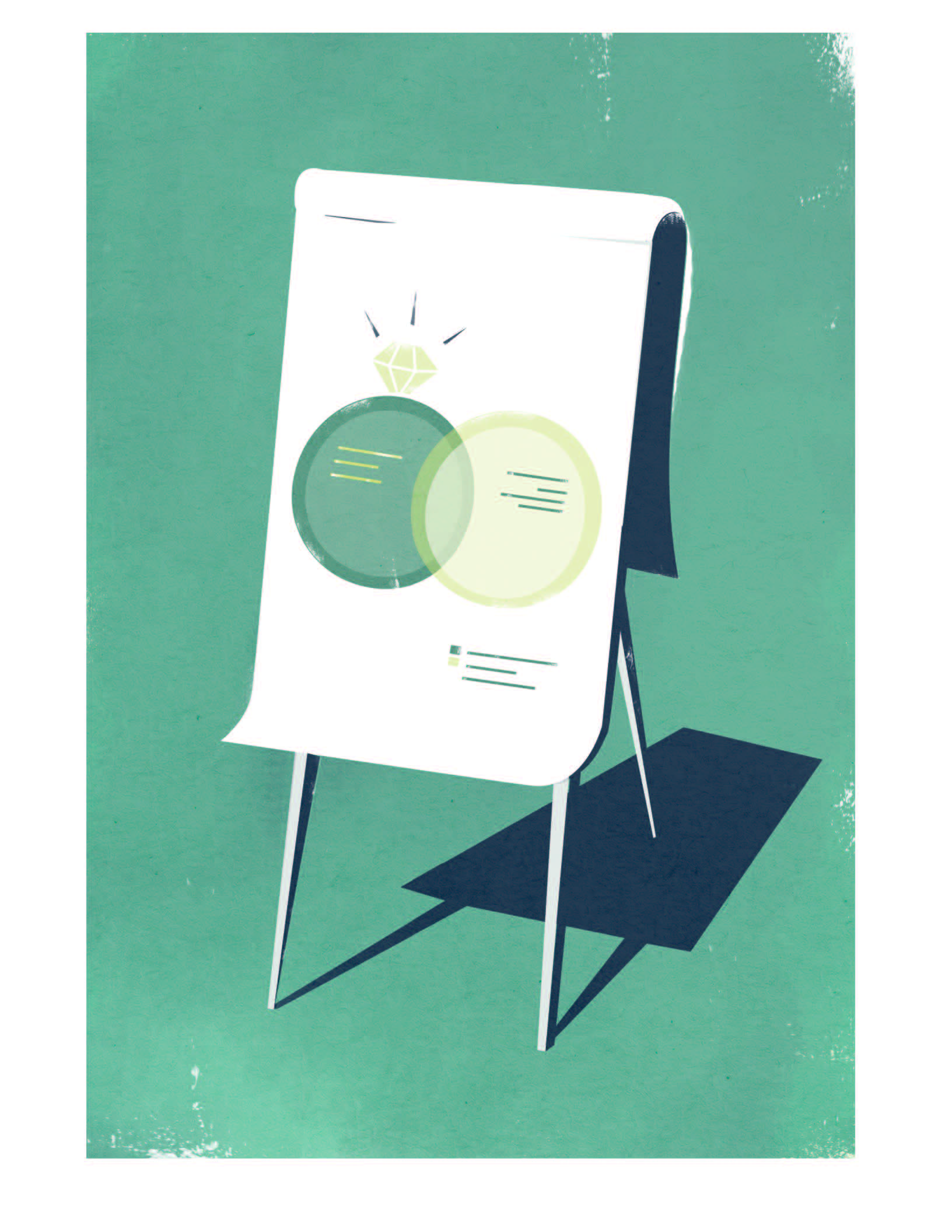
While starting and running any business isn’t for the faint of heart, it’s quite possible the most adventurous entrepreneurs start businesses with their spouses. There is more at risk. Those who do it successfully would argue there’s that much more to gain.
A relationship tethered to a business faces obvious challenges: A skewed work-life balance, merged identities, financial pressure and role confusion, to name a few. But there are benefits. For those who do it, going into business with a spouse means the most trusted person you know is on your team. There is often greater flexibility with childcare, and a common purpose can bring a family closer.
Just as no one business is the same, every couple in business has a unique story. We set out to speak to three couples about how they have adapted their relationships and businesses to suit their lives. Sometimes, the business strengthened the relationship. Other times, something – either the business or the relationship – had to give.
When Brittany Anderson and Rob Davy approached their families for start-up financing for an indoor paintball centre, everyone asked: “Are you sure you’re ready?” Their families weren’t asking about their readiness to run a paintball business, however. They were all concerned about whether the couple was ready to do it together.
The year had been a whirlwind. Anderson and Davy started dating in July of 2012. Anderson was planning an event at the University of Alberta as a business student. Davy was working for an audio visual company, All Star Show Industries, that Anderson decided to hire to put on the event. They worked together for a few months and, after the project, Davy and Anderson began dating.
By the fall, Davy had moved into Anderson’s place. Over Christmas, they put together the bulk of their business plan and, in the New Year, began looking for locations. They’d been a couple for nine months when they signed a five-year lease on 85,000 square feet of property in the heart of downtown.

“It only recently dawned on me,” Davy laughs, “that, in signing that lease, we were signing on to each other for a minimum of five years. Right now, I’m more concerned with sprinklers than whether we’ll be together in five years. That part was simply taken for granted and it feels awesome that it didn’t need to be discussed.”
Davy, who’s owned a mobile DJ company, an outdoor paintball field and a horse stable with a previous partner, continued, “We plan to take on the high-level management and hire operations staff. In this way, God forbid, if anything was to happen with us on the relationship front, the business will be fine.”
With financing secured, in mid-May they quit their stable, full-time jobs and began to see a lot more of each other. To the sounds of nail guns and concrete saws, the two worked crazy hours in preparation for Edmonton Paintball Centre‘s public opening in late 2013.
While they initially thought only one of them would start the company, they knew soon into the planning process that they would need both of their expertise. Surprisingly, neither are particularly passionate about paintball, but they like owning a business where people leave smiling and the profit margins are good.
“This has worked so well for us because Brittany and I equally understand the business. We can figure out problems together,” says Davy.
The equal understanding has helped alleviate challenges Davy knows of first-hand. “Part of the problem with my previous business is that I know almost nothing about horses: One end eats, the other poops, and they are really expensive. I could never run that business without my ex-wife. She had the passion, and I had the business side of things, and that didn’t work for us.”
For Anderson and Davy, their skills complement each other. They feel that the business has focused their growing relationship on the issues that really matter; they’re problem-solving sprinklers and layout, not the position of the toilet seat.
Neither of them can imagine starting a business without the other. In fact, if it was only one person involved, they wonder how they’d have maintained the relationship. The last year has been one of fevered preparation and they’re thankful to be doing it together.
While Anderson and Davy are just at the start of their relationship and business venture, another couple, Jessie Radies and her husband, Darcy, have spent the last year shifting out of business. They’d spent 12 years owning and operating The Blue Pear.
“It was a big part of our life as a couple and as a family. While we don’t regret it in any way, closing the restaurant came down to a lifestyle choice. The girls needed more time with their dad,” says Jessie.
When the couple married in 1999, they both were working in the food-service industry – Darcy was the head chef at Jack’s Grill and Jessie had spent a decade working for large fast-food multi-nationals.
“We got married in our mid-30s and we had a period in our marriage when we passed each other for a few hours in bed,” remembers Jessie. “We never got to see each other.”
A year after getting married, Jessie was ready for a professional change. They talked about opening a restaurant. She didn’t care what kind it was – they were all similar to manage. Darcy, however, had a passion for local food and an incredible culinary talent so, with his skill and her management experience, they opened The Blue Pear. Two years later, their first daughter was born.
“For a long time, it worked really, really well,” says Jessie, who started Original Fare and Live Local while she managed the restaurant. Jessie would be home with her two daughters most of the day, then a nanny would come from 6 p.m. to midnight so she could go to the restaurant. Darcy and Jessie saw a lot of each other. They could bring the kids to work.
They also had clear roles and responsibilities, physically delineated by the flooring that changed at the kitchen door. Darcy was boss inside the kitchen; Jessie was boss on the dining side. “I’d try to make a suggestion and tell him to do something one way and he’d shake his head and remind me, ‘You’re not on this side of the line.'”
Another reason Jessie feels their business relationship worked so well related to how they incorporated. Darcy was a majority shareholder with 51 per cent share to Jessie’s 49 per cent. “Our lawyer recommended that we not be equal partners because if you come to stalemate, there’s no one to vote to break the tie. I am more vocal and persuasive so we thought – ‘if I can’t convince him it’s a good idea, then it’s probably not a good idea.'”
For the Radies, their schedule only became a problem when their kids began school.
Jessie remembers the problem crystalizing at their oldest daughter’s ninth birthday. They’d had a small party in the morning and, when Jessie returned to the house after dropping the kids off at school, she found Darcy sitting stunned in his chair. She remembers him saying, “She’s halfway to 18 and I never get to see her.” It was then that they began to prepare for a change away from the restaurant business.
For a long time, owning and operating The Blue Pear was a great fit for the Radies’ relationship and their family. Their willingness to make a change when it didn’t work any more highlights a crucial fact: There’s a season for everything, including running a business as a couple.
For Tara Langlois and Bernie Roessler, who have owned a graphic design company called Plumbheavy Design for 14 years, change would come to their personal relationship even as their business grew.
They’d begun dating sometime during their studies at the University of Alberta (neither can remember the exact date). A year after graduating, in 2000, Langlois started Plumbheavy in her family’s basement. In 2001, Roessler quit his job and they moved to an office above Birks on 104th Street. Soon, they bought a condo together. It was close enough to walk to work. Roessler says: “It was just like any other office space, except with a kitchen.”
“In the beginning, design was everything,” says Roessler. “That was the day, the night, everything we talked about.”
As passionate designers running a start-up, all they had was the integrity of their work to keep the business afloat. “What that meant to us was that unless it was perfect, we couldn’t leave it,” says Langlois.
It also meant that they didn’t do anything as a couple besides work. “I’d wonder why Bernie didn’t ever want to spend time with me: He just wanted to go for bike rides alone, or golfing with his friends, but what about me?” says Langlois. “I wanted to do more non-business related things. But, we couldn’t go out for dinner and say, ‘How was your day?’ Because I knew exactly what happened – I was there!”
“I remember leaving the condo early some days just so I could walk to work by myself – just so I could get five minutes alone!” says Roessler.
“And I just wanted a birthday present!” she digs back as Roessler hides behind his Orangina bottle. He concedes that the financial pressure was significant. “We ran the company as skinny as possible. We’d only pay ourselves the bare minimum – for mortgage and groceries. There was no extra money for vacation – or for birthday gifts,” he looks to Langlois. “I’m sorry!”
When Roessler moved out, their friends waited for the business to fold. But he never considered leaving. There was nothing else that he wanted to do.
Langlois didn’t want to leave the business either. “I could have done anything but I didn’t want to. I liked what we had, I loved what we built up,” she says.
The next two years were tough. Their one staff person left, another designer came and left. During that time they went from an open-concept office to erecting six-foot high pony walls. Then, the tension in the office began to ease.
“We weren’t suited for a personal relationship. Over time, you realize that it worked out how it was supposed to. I mean, there is no one I trust more than Bernie and I wouldn’t do this with anyone else,” says Langlois.
Roessler agrees, “I’m a much better designer because of Tara. I don’t see the things she sees, and that helps me. While the relationship didn’t work, from a business standpoint I knew this was a person I still wanted to be in business with.”
These days, they allow themselves vacations and weekends. They climb together three mornings a week. Roessler has a one-and-a-half-year-old daughter and Langlois travels; they talk about life after work more now than ever. In fact, after lunch, they’ll head to Whyte Avenue together to find a birthday gift for Roessler’s wife of three years.
As Langlois and Roessler enter a more balanced phase in their business, and Anderson and Davy ramp up, the Radies’ have taken a year to adjust. Their restaurant-free schedule sees their whole family eating dinner together. While Jessie works full-time as a consultant, Darcy’s part-time consulting work allows him to pick up the girls from school and take them to soccer. Almost a year after selling their business, their daughters continue to exclaim; “It feels like we’re on vacation.”
“We are all adjusting,” says Jessie. “But we wouldn’t have changed any of it.”









